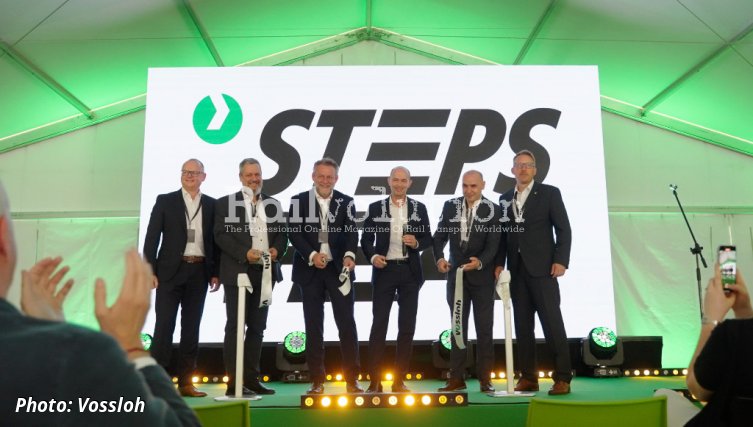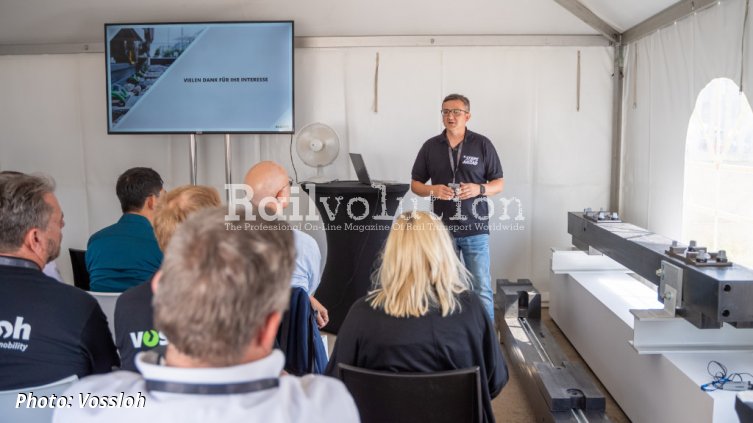“StEPS ahead” with the environmentally friendly EPS
posted on 18th Jun 2024 11:55
On 6 June 2024, Vossloh, together with customers and partners, ceremoniously opened the first automated production facility for the self-developed composite sleeper Engineered Polymer Sleeper (EPS) in Nowe Skalmierzyce, Poland, at Vossloh Skamo. The latter is a subsidiary in Poland, where rail fastening systems have primarily been manufactured since 1984.
The ultra-modern and largely automated production line will initially manufacture around 100,000 composite sleepers per year. The product portfolio will include track and turnout sleepers as well as special products for railroad bridges. The EPS are made from secondary raw materials and are fully recyclable at the end of their 50-year service life. An innovative tool concept enables the product design to be quickly adapted to customer requirements. The production process complies with all European energy standards and the topic of sustainability was also a focus from the outset when designing the individual production steps. For example, only green electricity is used in production and energy is recovered and reused wherever possible.
The composite sleepers are the successful result of more than ten years of development work by the experts at Vossloh. The aim was to create an ecological composite sleeper that combines the positive properties of concrete, wood and polymer sleepers. This is made possible by the innovative material amalentic. The isotropic material meets the most important product requirements to a particularly high degree, such as high weather resistance, low thermal expansion, high track stability and stable track gauge.
"Both the EPS product itself and the ultra-modern production facility are masterpieces by the engineers involved. With our new composite sleeper, we are creating a sustainable and durable alternative to wooden sleepers, which are no longer allowed to be used in more and more countries around the world due to their impregnation with chemicals that are harmful to the environment and health. In future, our latest innovation can be used wherever technical requirements mean that concrete ties cannot be substituted. At Vossloh, we not only enable green mobility, but also do so in a sustainable and responsible manner. I am very confident that this product, with its outstanding product properties and exemplary eco-balance, has a successful future ahead of it," says Oliver Schuster, Executive Board Chairman of Vossloh AG.
In varied presentations, the guests learned from the experts from Vossloh and the Technical University of München about the milestones and approvals that have already been achieved with EPS:
- The development of sustainable Engineered Polymer Sleepers made of amalentic,
- The economical solution for every application,
- Standards and requirements for plastic sleepers,
- Everything from a single source: the integrated solution for turnouts,
- The adaptable solution for complex bridge applications.
Amalentic is the material mixture developed in-house, which consists exclusively of secondary raw materials of industrial quality and is 100 % recyclable. The isotropic material guarantees consistently important properties such as high compressive strength, high lateral track stability and stable track gauge over a very long service life.
The numerous exhibits and project examples also illustrated how flexible the sleeper geometry of the track and turnout sleepers and bridge beams can be adapted according to customer requirements: from improved regulation options and faster installation in the track to better force transmission. The decisive 'step ahead' is the more economical use of direct fastenings, which, compared to conventional direct fastenings, ultimately also enables higher elasticity in addition to numerous technical advantages.
Many aspects, including drill holes – also with inclination and thread – as well as different lengths and heights, can already be taken into account during the production process, so that subsequent machining can be dispensed with in many cases. If mechanical adjustment is nevertheless necessary, it can be carried out without any protective measures for the fitter, as the EPS is not made of glass fibres.
The highlight of the inauguration ceremony at the Polish site was certainly the tour of EPS production. Here, the guests learned about a manufacturing process that is unique for composite sleepers in Europe and probably in the whole world. A special feature of EPS and above all its manufacturing process is the multifunctional tool concept. For the first time, it opens up application possibilities for customers in the track that were previously not feasible. Vossloh is starting with an annual capacity of 100,000 sleepers with a cleverly measured degree of automation. When designing the plant, care was taken to ensure that every production step is sustainable and meets European energy standards. Wherever possible, energy is recovered and reused. This includes the use of green electricity.
Batch production not only increases potential and demand. In fact, Vossloh wants to establish a global standard for plastic sleepers with the ecological evolution of the plastic sleeper, manufactured according to international standards and exclusively from green electricity. Whenever a concrete sleeper does not meet the requirements, the engineered polymer sleeper is to be used, according to Vossloh's understanding of enabling green mobility.


